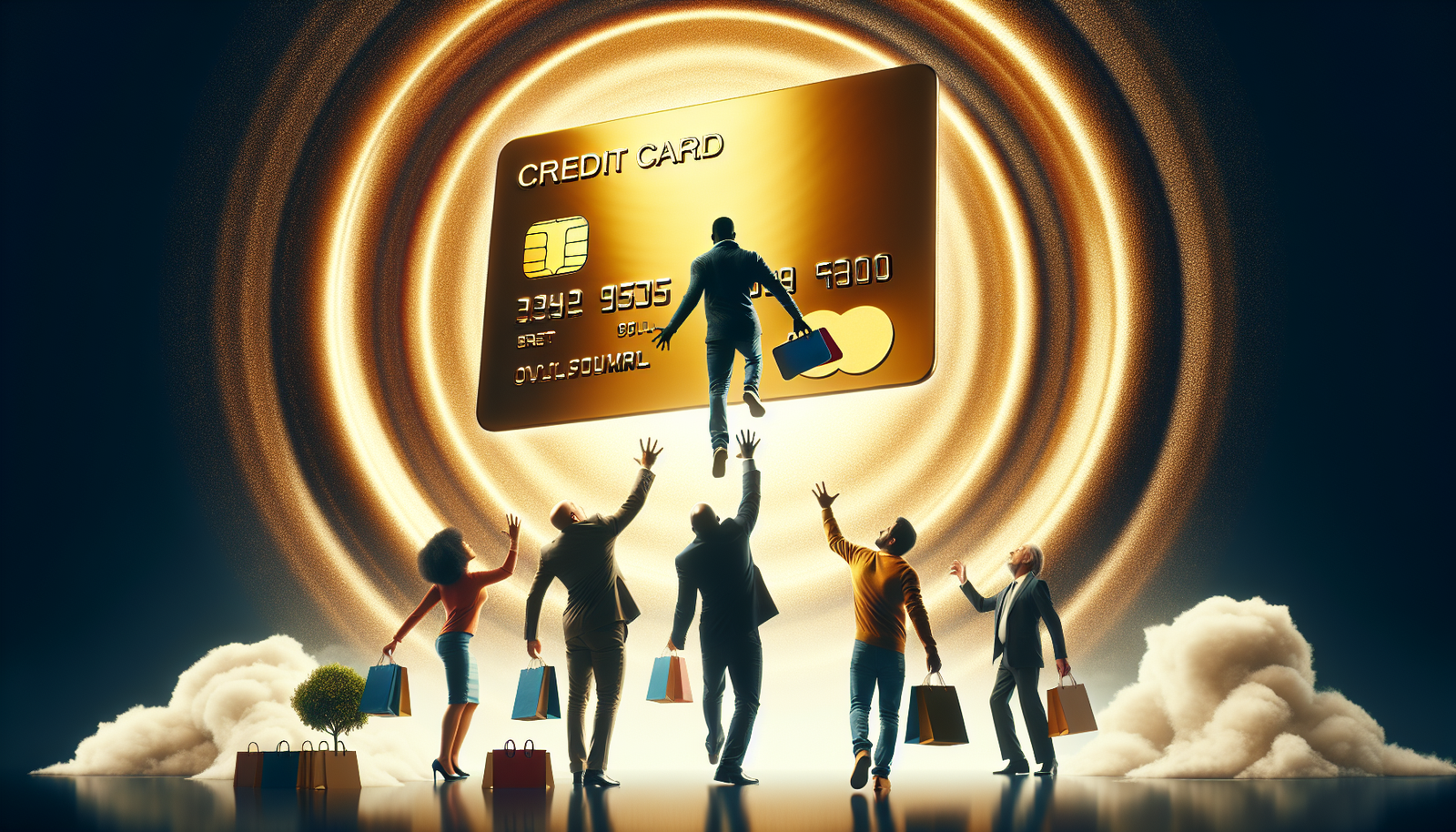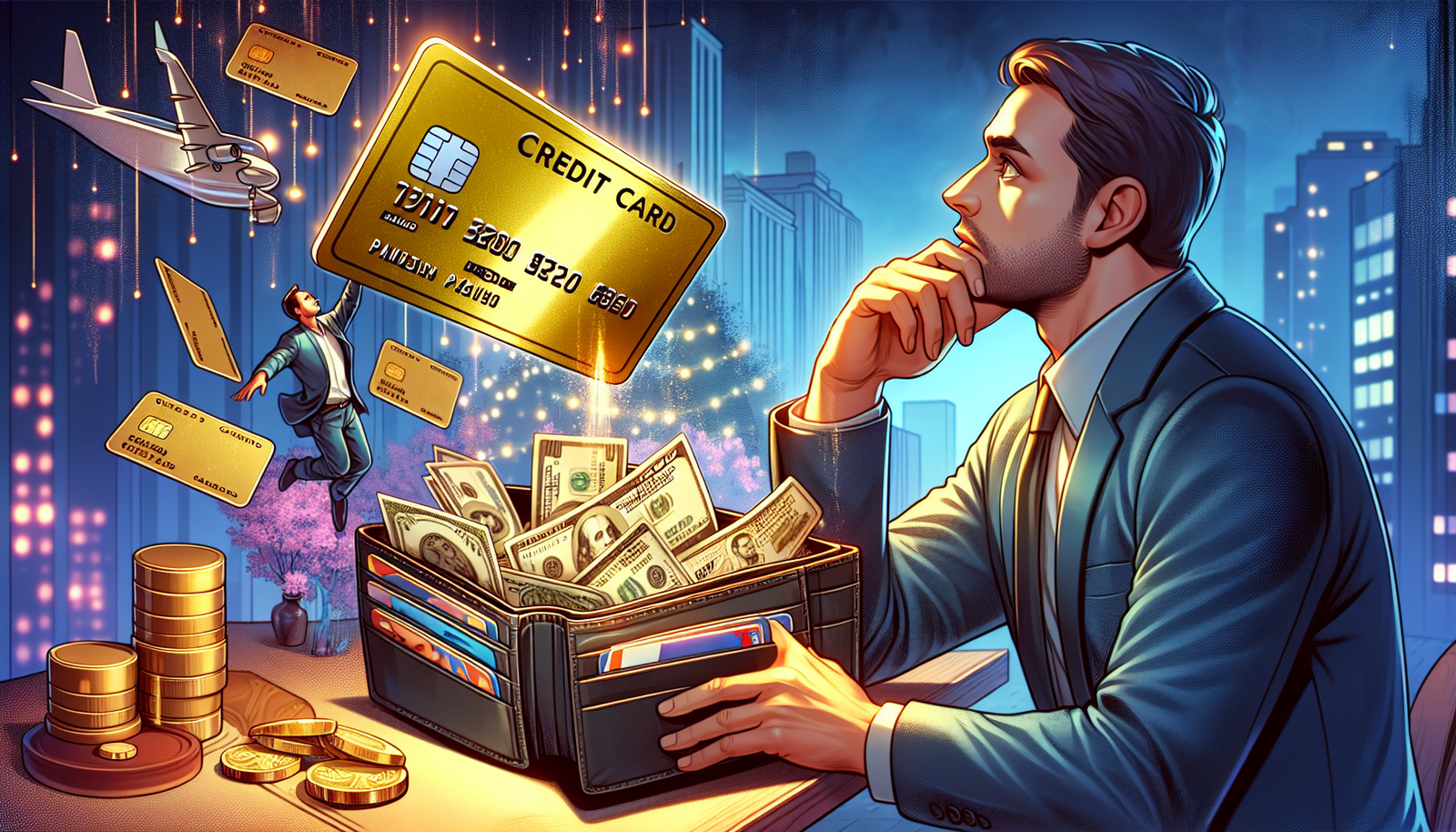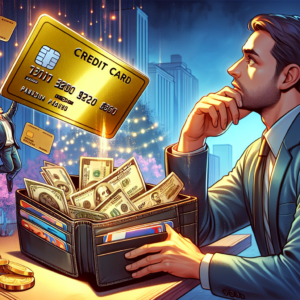In this article, we’ll explore an important aspect of credit card usage that often goes unnoticed: the potential for overspending. While credit cards offer convenience and flexibility, they can also be a slippery slope towards financial trouble, particularly when we’re not adhering to a budget. By delving into the reasons behind this phenomenon and discussing practical tactics to avoid falling into the overspending trap, we aim to equip you with the knowledge and tools needed to make informed decisions about your finances. So let’s dive right in and uncover the hidden dangers of credit card usage.
The Influence of Credit Cards on Spending Habits
Credit cards have undoubtedly revolutionized the way we handle and manage our finances. With their convenience and ease of access to credit, they have become an integral part of our daily lives. However, it is important to understand the significant impact that credit cards can have on our spending habits.
The convenience of credit cards
One of the primary reasons why credit cards have become so popular is their convenience. With just a swipe or a tap, you can make a purchase without having to carry around cash. This convenience makes it easy to make impulsive purchases, as you don’t have to think twice about whether or not you have enough money in your wallet. This can lead to overspending, especially when you’re not keeping track of your expenses.
Easy access to credit
Credit cards provide us with instant access to credit, allowing us to buy items and services even when we don’t have the money upfront. This can be both a blessing and a curse. While it does give us the flexibility to make purchases when we need to, it can also lead to uncontrolled spending. The ease of access to credit can create a false sense of affordability, making it tempting to spend beyond our means.
Delayed payment and the illusion of affordability
Perhaps one of the most deceiving aspects of credit cards is the delayed payment feature. When you make a purchase using a credit card, you are essentially borrowing money from the credit card company. You don’t have to pay it back immediately, but rather at a later date when the monthly bill arrives. This delayed payment can create an illusion of affordability, making it easy to overspend without realizing the consequences until the bill arrives. It’s important to remember that credit card purchases are not free money, and the debt will eventually need to be repaid.
The Psychological Effects of Credit Cards
Beyond the convenience and accessibility, credit cards also have significant psychological effects that can influence our spending habits.
The disconnect between spending and money
When we use credit cards, there is a disconnect between the act of spending and the actual exchange of physical money. Unlike cash transactions, where we physically see the money leaving our hands, credit card transactions can feel less real and more abstract. This disconnect can make it easier to spend without fully considering the financial impact of our purchases.
The influence of marketing and consumerism
Credit card companies often partner with merchants and offer exclusive deals and promotions to their customers. These marketing strategies can create a sense of urgency and temptation to make impulsive purchases. Additionally, the constant exposure to advertisements and consumerism in our society can also contribute to the desire to spend beyond our means. It’s important to be aware of these influences and make conscious decisions about our spending habits.
The dopamine effect of credit card use
The act of using a credit card can trigger the release of dopamine, a neurotransmitter associated with pleasure and reward. This can create a sense of instant gratification and satisfaction when making purchases with a credit card. The dopamine effect can lead to impulsive and excessive spending, as we seek that temporary feeling of happiness and reward. It’s crucial to recognize and control this urge to overspend for short-term satisfaction.

The Implications of Not Sticking to a Budget
One of the biggest pitfalls of credit card usage is the tendency to overspend when we don’t stick to a budget.
Lack of financial discipline
Using credit cards without a budget or spending plan in place can easily lead to overspending. Without clear guidelines and limits on our expenses, it’s easy to lose track of how much we are actually spending. Lack of financial discipline can result in accumulating debt and financial stress in the long run.
Accumulation of debt
Failure to stick to a budget and overspending with credit cards often leads to the accumulation of debt. When we consistently spend more than we can afford to repay, we start carrying a balance on our credit card. This balance incurs interest charges, making it more challenging to pay off the debt. Over time, the debt can snowball, trapping us in a cycle of financial instability.
Difficulty in achieving financial goals
Overspending with credit cards can hinder our ability to reach our financial goals. Whether it’s saving for a down payment on a house, paying off student loans, or building an emergency fund, excessive credit card debt can drain our resources and delay our progress. Without financial discipline and proper budgeting, it becomes challenging to allocate funds toward our long-term goals.
Credit Card Rewards and Temptation to Overspend
While credit card rewards and cashback programs can provide benefits, they can also tempt us to overspend.
Cashback and rewards programs
Credit card companies often offer cashback or rewards programs as an incentive to use their cards. These programs can be attractive, as they allow us to earn rewards for our regular spending. However, the desire to accumulate more rewards can lead to overspending or making unnecessary purchases just to earn those rewards. It’s important to evaluate the cost-benefit ratio of these rewards and consider if they truly align with our financial goals.
Impulse purchases to earn rewards
Credit card rewards programs can encourage impulse purchases, especially when there are limited-time promotions or bonus rewards for certain categories of spending. The temptation to earn more rewards can override our rational thinking, leading to impulsive and unnecessary purchases. It’s essential to distinguish between essential spending and impulse spending driven by the desire for rewards.
Difficulty in redeeming rewards
While accumulating credit card rewards may seem enticing, the process of redeeming those rewards may not always be as straightforward. Some rewards programs have restrictions or complicated redemption processes, making it challenging to actually benefit from the rewards we’ve earned. This can lead to frustration and a feeling of being misled. Before being swayed by enticing rewards programs, it’s crucial to understand the terms and conditions and evaluate if the rewards are worth the potential overspending.

Influence of Peer Pressure on Credit Card Spending
Peer pressure and societal influences can play a significant role in our credit card spending habits.
Comparison shopping and social media
In today’s digital age, social media platforms and online shopping have become integral parts of our lives. Constant exposure to social media posts and advertisements showcasing luxurious lifestyles can lead to unhealthy comparisons and a fear of missing out (FOMO). This can prompt us to spend beyond our means in an attempt to keep up with the trends and lifestyles we see online. It’s essential to remember that social media often presents an unrealistic and curated version of reality, and our financial well-being should not be determined by others’ perceived lifestyles.
Fear of missing out (FOMO)
The fear of missing out, commonly known as FOMO, can lead to impulsive credit card spending. Seeing friends or colleagues indulge in experiences or possessions can create a sense of urgency to participate in the same activities or acquire similar items. However, succumbing to the fear of missing out can result in poor financial decisions and potentially contribute to long-term debt. It’s important to prioritize our own financial well-being over the fear of missing out on temporary experiences or material possessions.
Social pressure to keep up with lifestyles
Societal pressure to keep up with certain lifestyles or standards can heavily influence our credit card spending habits. Whether it’s buying the latest gadgets, dining at expensive restaurants, or wearing designer clothing, the desire to fit in and conform to societal norms can lead to overspending. It’s crucial to separate our personal values and financial priorities from societal expectations and make conscious decisions that align with our own goals and aspirations.
High-Interest Rates and Minimum Payments
The financial consequences of credit card overspending are further magnified by high-interest rates and minimum monthly payments.
The cost of carrying a balance
When we carry a balance on our credit cards, we are charged interest on that balance. Credit card interest rates are typically higher than other forms of debt, such as mortgages or auto loans. As a result, the cost of carrying a balance can quickly accumulate and have a significant financial impact. It’s important to be mindful of interest rates and aim to pay off credit card balances in full each month to avoid unnecessary interest charges.
Minimum payments and debt accumulation
Credit card companies typically require a minimum monthly payment, which is often just a small percentage of the total balance. While making the minimum payment keeps the account in good standing, it doesn’t significantly reduce the overall debt. By only making minimum payments, we run the risk of accumulating more debt over time and prolonging the time it takes to pay off the balance. It’s crucial to strive for more substantial payments and pay off credit card debt as soon as possible.
Limited ability to pay off the full balance
High-interest rates and limited financial resources can make it challenging to pay off the full credit card balance each month. This can result in a cycle of debt, where we continue to carry a balance and accumulate interest charges. It’s important to evaluate our financial situation regularly and make necessary adjustments to ensure that we have the ability to pay off the full balance whenever possible. By doing so, we avoid unnecessary interest charges and take control of our financial well-being.
The Role of Credit Card Companies in Encouraging Overspending
Credit card companies actively play a role in encouraging overspending and increased credit card usage.
Credit limit increases
Credit card companies often offer credit limit increases to their customers based on their spending patterns and credit history. While a higher credit limit may seem beneficial, it can also lead to an increased temptation to overspend. The availability of a larger credit limit can create a false sense of financial security and encourage us to make purchases beyond our means. It’s important to carefully consider credit limit increases and only accept them when truly necessary and manageable within our budget.
Targeted marketing strategies
Credit card companies employ targeted marketing strategies to promote their products and services. These strategies are designed to appeal to our desires, aspirations, and emotions, making us more likely to use credit cards for our purchases. It’s important to be aware of these marketing tactics and make informed decisions based on our own financial needs and priorities rather than succumbing to clever advertising.
Promotional offers and limited-time deals
Credit card companies often introduce promotional offers and limited-time deals to entice customers to use their cards. These offers may include discounted prices, exclusive access to events, or bonus rewards for specific types of spending. While these promotions may seem attractive, it’s crucial to evaluate whether the associated spending aligns with our financial goals and budget. Falling for these limited-time deals without careful consideration can lead to impulsive spending and potential financial strain.
Convenience and Impulse Spending
The convenience of credit cards, particularly in the age of online shopping, can contribute to impulse spending.
Ease of online shopping
Online shopping has revolutionized the way we make purchases, offering convenience and accessibility like never before. With just a few clicks, we can complete transactions and have our purchases delivered to our doorstep. The ease of online shopping removes many barriers and makes it tempting to indulge in impulsive purchases without taking the time to consider the long-term financial consequences.
One-click purchases
One-click purchasing options, popularized by e-commerce giants, further facilitate impulse spending. With stored payment information and simplified checkout processes, the act of making a purchase becomes almost effortless. This convenience can lead to unplanned and unnecessary spending, as we’re not provided with the opportunity to second-guess our decisions or consider alternative options.
The impact of subconscious buying
Credit cards enable what is often referred to as “subconscious buying.” The instant gratification of swiping a credit card can override our rational thinking, leading to impulsive purchases based on fleeting desires or momentary emotions. The ease of credit card usage can detach us from the reality of our financial situation, making it easier to spend without critical evaluation. It’s important to be mindful of our spending habits and make intentional purchases that align with our true needs and priorities.
Lack of Financial Education and Awareness
The lack of financial education and awareness regarding credit card usage can contribute to overspending and financial instability.
Limited understanding of interest rates and fees
Many individuals lack a comprehensive understanding of credit card interest rates and associated fees. This lack of knowledge can lead to complacency and a disregard for the long-term financial impact of credit card usage. It’s crucial to educate ourselves about interest rates, payment terms, and the consequences of carrying a balance to make informed decisions and exercise financial responsibility.
Misconceptions about credit card usage
There are several misconceptions surrounding credit card usage that can contribute to overspending. Some individuals falsely believe that credit cards are equivalent to free money or that using credit cards will improve their credit score automatically. These misconceptions can lead to irresponsible spending habits and financial difficulties in the long run. It’s essential to debunk these misconceptions and ensure that we fully understand the principles of credit card usage before making financial decisions.
The need for financial literacy programs
Given the influence of credit cards on spending habits and the potential for overspending, there is a growing need for financial literacy programs. These programs can equip individuals with the necessary knowledge and skills to make informed financial decisions. By promoting financial literacy from a young age, we can foster responsible credit card usage and build a foundation for a financially secure future.
Tips for Avoiding Overspending with Credit Cards
While credit cards can present challenges to our spending habits, there are strategies we can implement to avoid falling into the trap of overspending.
Creating and sticking to a realistic budget
Establishing a budget is essential for managing our finances effectively. By tracking our income and expenses, we can set realistic spending limits and allocate our resources accordingly. A budget serves as a roadmap, helping us prioritize our financial goals and avoid unnecessary debt.
Tracking expenses and setting spending limits
Regularly tracking expenses allows us to identify areas where we may be overspending and make necessary adjustments. Additionally, setting spending limits for different categories, such as dining out or entertainment, can help us stay within our budget and avoid impulsive purchases. By being mindful of our spending patterns, we can make more conscious decisions and avoid falling into the trap of overspending.
Safeguarding against impulse purchases
To protect ourselves from impulse purchases, it’s important to implement strategies that create a pause between the desire to buy and the actual purchase. This can include waiting 24 hours before making a purchase, leaving credit cards at home when unnecessary, or implementing self-imposed restrictions on impulsive spending. By introducing these safeguards, we can regain control over our spending habits and make intentional decisions that align with our long-term financial goals.
In conclusion, credit cards have undoubtedly revolutionized the way we handle our finances, providing convenience and easy access to credit. However, it is crucial to be aware of their potential influence on our spending habits. Understanding the psychological effects, implications of not sticking to a budget, temptation to overspend for rewards, peer pressure, high-interest rates, and the role of credit card companies can help us make more informed financial decisions. By practicing financial discipline, educating ourselves, and implementing strategies to avoid impulsive spending, we can take control of our credit card usage and achieve greater financial stability and peace of mind.

